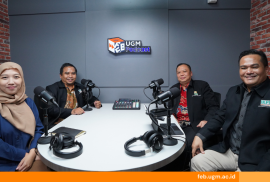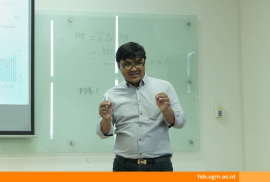The Accounting Laboratory, Department of Accounting, Faculty of Economics and Business (FEB) UGM together with the Master of Science and Doctoral Study Program (MD) FEB UGM held a Webinar Series with the theme “Philosophy and Approaches to Accounting and Business Research”. The introduction and understanding of philosophy and research approaches that are important for researchers as well as students in conducting research is the essence of the series. The Webinar Series consists of 7 series of discussion sessions with 7 different topics in each session which will be held from 9 April – 4 June 2021. On Friday (9/04) the first webinar of the series was successfully carried out with the topic “Introduction to the Philosophy of Accounting Research. and Business ”.
This discussion session through the Zoom platform and Youtube FEB UGM was opened by a Master of Ceremony (MC), namely Laksmi Chandra Suharto, S.E. Before entering the core of the event, a warm welcome was given by the Dean of FEB UGM, Eko Suwardi, M.Sc., Ph.D., which was followed by the introduction of the event moderator, Annisa Hayatun Nazmi Burhan, SE, M.Sc., who guided the event. Starting from accounting and management lecturers, students, educators, to practitioners attended the webinar as participants and enthusiastically listened to the speakers for this session, Vogy Gautama Buanaputra, M.Sc., Ph.D., AFHEA.
The main event of the discussion session began with the presentation of material by Vogy Gautama whose aim was to try to introduce paradigms such as positivism and critical realism to the webinar participants. In his presentation, he explained the fundamentals of the philosophy of science as a bridge for the next discussion sessions of the webinar series. Broadly speaking, Vogy defines philosophy as a search for a main principle. “It is important for us to study philosophy because philosophy will help us in clarifying research.”, He said, emphasizing the importance of philosophy.
The first paradigm introduced in material elaboration is positivism. Positivism is considered a mainstream paradigm and it is not difficult to find it in existing studies. This paradigm tends to use a natural science approach and universal explanation with a scientific approach. The second paradigm is interpretivism. In contrast to the previous paradigm, interpretivism is considered non-mainstream and departs from an ontology that is different from positivism. This paradigm pioneered by Max Weber assumes that reality is subjective and is constructed by social actors. Research with this paradigm uses methods that aim to understand the interpretations of the actors, such as interviews and observations.
The third paradigm explained by the speaker is phenomenology. This paradigm is still related to interpretivism, but it does not merely focus on the reality created by social actors. Phenomenology focuses on how to interpret interactions, processes, and phenomena from a subjective point of view. The fourth paradigm is post-structuralist pioneered by Michel Foucault, Jacques Derrida, and Ernesto Laclau. Post-structuralism originates from structuralism which tends to lead to positivism and is interpreted as a social structure that conditions social actors. However, this paradigm then opposes the thought of structuralism and assumes that reality is formed subjectively which is mediated by language and text. “Truth is very, very relative because it is limited by time and space, historical, cultural, and others,” explained Vogy.
Next, the speaker elaborated the critical paradigm and the critical realism paradigm. The critical paradigm is influenced by the ideas of classical Marxism and is inspired by the dialectical paradigm of Nietzsche, Max Weber, and Habermas. This paradigm believes that individuals or societies have historical potential that cannot be realized due to the material domination system that allows repression and the use of social power. An example of research using this paradigm is an investigation of how accounting practices in the production section by Uddin & Hopper (2001).
Meanwhile, the critical realism paradigm which departs from the opinion about something that we cannot see and cannot be touched empirically, does not mean it does not exist. Some see this paradigm as an alternative between objective positivism and relative post-structuralism. Broadly speaking, critical realism assumes that reality exists independently of social agents and contains elements of objectivism. An example of research using this paradigm is the investigation of generative mechanisms that condition corporate governance practices by Ahmed & Uddin (2018). The discussion then continued with a question and answer session which was guided by the moderator. The webinar participants enthusiastically asked questions to the speaker in order to further explore and understand the material in that afternoon.
Reportage: Kirana Lalita Pristy/Sony Budiarso.




